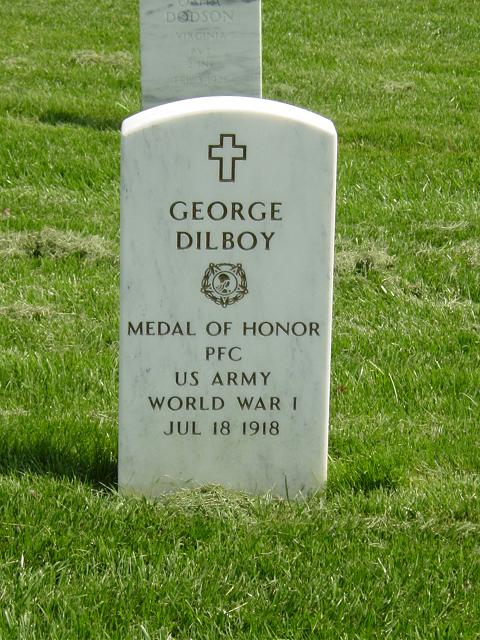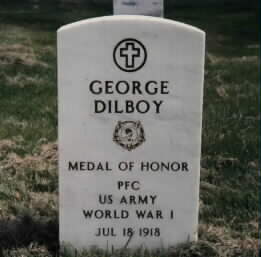October 2005:
Belleau Wood hero George Dilboy astounded Germans by singlehandedly attacking “the Wood, “which was infested with Machine gun nests, and wiping out three guns before the Germans fled. Equally astonished were his fellow doughboys of World War I.
WOBURN, MASSACHUSETTS – Georgie! My Georgie! – Eddie Brady’s new book is a biography written as a Novel based on amazing true story of this Greek-immigrant George Dilboy who fought in four wars in three continents before he was 22-years of age.
Brady, who lived many years on Samoset Road in West Woburn and is now a resident of Winchester, believes Dilboy could have been America’s Winston Churchill.
General John “Black Jack” Pershing listed George Dilboy as one of the 10 greatest hero’s of the war. It is the first time a book has been written about George Dilboy.
Brady is also well known in the Greek community, as a long-time member of the Greek Orthodox Church in Woburn on Montvale Avenue.
In addition, the book comes at a time Woburn motorists have noticed the demolition of Dilboy Stadium in Somerville “on the back road” into Boston through Medford and Somerville near the Medford-Somerville line.
Also, in Somerville, a mini-debate erupted earlier this year when veterans groups had sentiments to name the new stadium after the late Senator Charles Shannon, a resident of Winchester, who represented Winchester, Ward 2 in Woburn and most of Somerville. Shannon died on April 5th of this year and had secured some $8 million in state funding to re-build the crumbling Dilboy Stadium.
And, after some debate, the Shannon family and veteran groups agreed the Dilboy contribution was a major one to this country and the new stadium should be kept as Dilboy Stadium. A plaque will recognize Senator Shannon’s efforts.
Dilboy had the distinction of being honored by three U.S. Presidents, Woodrow Wilson, who signed the authorization awarding the Medal of Honor, Warren G. Harding, who brought him back to Arlington National Cemetery and Calvin Coolidge, former Governor of Massachusetts, who presided at his final burial.
Brady describes how Dilboy’s death devastated his family and fiance, though it had inspired his fellow soldiers. He describes how the American doughboy Army followed Dilboy’s example and drove the Germans out of Belleau Wood and all the way back toward the German lines, as part of the Second Battle of the Maine, which saved Paris and the war for the Allies.
Brady narrates how the body of Dilboy was buried in the Greek settlement of Alatsata, his place of birth, in today’s Western Turkey at the request of his father, Antonios. Rampaging Turkish soldiers, during the three-year Greco-Turkish War of 1919-1923, burned Smyrna to the ground and massacred tens of thousands of Greeks, and went on to desecrate Dilboy’s grave.
Incensed, President Warren G. Hardy sent the warship, USS Litchfield, half way across the world to Turkey in September, 1922 to recover the bodily remains. He also demanded an apology from the Turkish government. He got both.
“This manner of the recovery of the body of an American soldier, and a humble U.S. Army Private, at that, from enemy territory after a war, was unprecedented. The President resolutely acted against this outrage, while dismissing warnings that it might trigger a restart of World War I,” continued Brady.
Research for three years…
The author’s three-year research effort was able to dig up the details of this amazing individual’s life going back to the land of his birth in Asia Minor. He follows Dilboy from his restless, dangerous youth feuding with the Turks, as Greece had been doing for the prior 400 hundred years, to his emigration to America in 1908 and settling in Somerville, Mass., a city near Boston.
Brady goes on to tell how Dilboy returned to mainland Greece, after adding a year to his age, to successfully fight for Greece as a volunteer in the Greek Army in Thessaly in the First Balkan War of 1912.
Dilboy remained there to successfully fight in Macedonia in the Second Balkan War of 1913. Returning to Somerville, he went to school and worked for a few years before volunteering to fight in the US Army in the Mexican Border War in 1916-17.
He obtained an honorable discharge and within months thereafter re-joined the US Army to fight in France in the Great War in 1917-18. Brady writes about fascinating incidences concerning Dilboy that continued after his death into World War II, the 1990’s and as late as 2005. “It’s a story without an ending,” he enthuses.
“The story has more twists and turns, and ups and downs than a roller coaster ride, and is, in turn, thrilling, comedic and tragic,” says Brady. “It is not a happy story, but one you will never forget,” is Brady’s conclusion.
About the Author
Born and brought up in Somerville, Brady graduated from Northeastern University and Suffolk University School of Law, in Boston. He practiced law for over thirty years. He was a resident of Samoset Road in West Woburn and now lives in Winchester.
Georgie! My Georgie!
By Eddie Brady Publication Date: Sept. 8, 2005 Trade Paperback; $26.96; 511 pages
Xlibris is a publishing services company based in Philadelphia and a strategic partner of Random House Ventures, LLC, a subsidiary of Random House, Inc. Xlibris books can be purchased in any major bookstore, or online at Amazon, Barnes & Noble, Borders or Xlibris.
Born in Greece on Februry 5, 1896, he entered the Army from New Hampshire and earned his Medal of Honor during World War I while serving with Company H, 103rd Infantry at Belleau, France, on July 18, 1918.
He was killed in action and was subsequently buried in Section 18 of Arlington National Cemetery.
DILBOY, GEORGE
Rank and organization: Private First Class, U.S. Army, Company H, 103d Infantry, 26th Division. Place and date: Near Belleau, France, 18 July 1918. Entered service at: Keene, New Hampshire. Birth: Greece. G.O. No.: 13, W.D., 1919.
Citation:
After his platoon had gained its objective along a railroad embankment, Pfc. Dilboy, accompanying his platoon leader to reconnoiter the ground beyond, was suddenly fired upon by an enemy machinegun from 100 yards. From a standing position on the railroad track, fully exposed to view, he opened fire at once, but failing to silence the gun, rushed forward with his bayonet fixed, through a wheat field toward the gun emplacement, falling within 25 yards of the gun with his right leg nearly severed above the knee and with several bullet holes in his body. With undaunted courage he continued to fire into the emplacement from a prone position, killing 2 of the enemy and dispersing the rest of the crew.
DILBOY, GEO
PVT 1/C H 103D INF 26TH DIV WW N H
- VETERAN SERVICE DATES: Unknown
- DATE OF DEATH: 07/18/1918
- DATE OF INTERMENT: 11/12/1923
- BURIED AT: SECTION 18 SITE 4574
ARLINGTON NATIONAL CEMETERY
Michael Robert Patterson was born in Arlington and is the son of a former officer of the US Army. So it was no wonder that sooner or later his interests drew him to American history and especially to American military history. Many of his articles can be found on renowned portals like the New York Times, Washingtonpost or Wikipedia.
Reviewed by: Michael Howard


